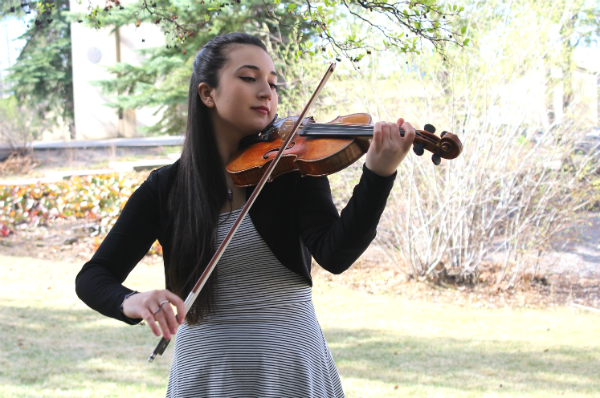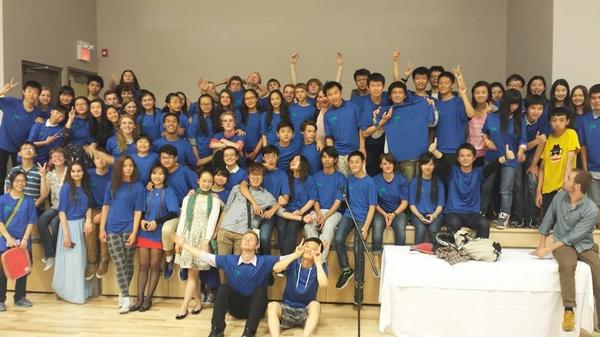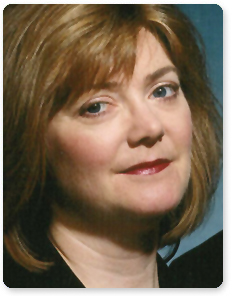Seven Series Centre Stage
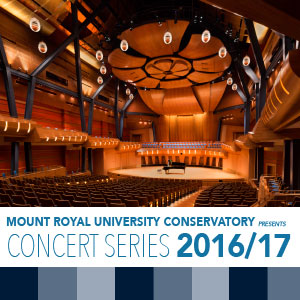
The excitement is electric.
The sound-check’s done and… we’re about to take centre stage.
In 2015, we completed construction and opened the Award-winning Bella Concert Hall and the Taylor Centre for the Performing Arts. While it still has that ‘new theatre smell’ we’d like to amplify its acoustics by showcasing the finest local, national and international talent to play it.
We would like to announce the debut of SEVEN CONCERT SERIES taking place at the versatile venues in the Mount Royal University Conservatory’s Taylor Centre for the Performing Arts in 2016-17. These concert events will showcase some of the most innovative contemporary artists to bring music to your ears. We want our MRU Insiders to be the first to know what’s up.
Join us on May 13th, 2016 as we announce the line-up.
This will take place at the James Ehnes concert, our final Wyatt Series event for this season.
For tickets, go to tickets.mru.ca or call 403-440-7770.
Our follow us online for up-to-the-moment social media releases. (Follow @MRUConservatory or mtroyal.ca/enjoy)

Soundscape Series
The Bella Concert Hall was built on sound.
The Soundscape Series showcases the amplification of these artistic vibrations in their acoustic glory.
* 5 concerts from local, national and international influential artists and ensembles.
Travelers Series
Importing world-class musicians from around the globe. Let’s give them a true Calgarian white-hatted welcome.
* 5 concerts will take audiences on musical adventures in many musical genres.
 Northern Lights Series
Northern Lights Series
2016 is the Year of Music in Calgary. 2017 is Canada’s 150th Birthday.
What better way to celebrate our home and native land than to feature some of its finest artists.
*5 concerts will define our country’s energy, diversity and talent.
Wyatt Series
Our celebrated Wyatt Series continues to feature contemporary masters of classical works in performance and mentorship of our music students. This series honours the late Hal and Marnie Wyatt, longtime supporters of the Mount Royal University Conservatory.
* 3 concerts from modern masters.
 Family Portrait Series
Family Portrait Series
Music, Speech Arts and Theatre are for all-ages. To ensure that the younger family members, and those who are young at heart, get to experience amazing music and storytelling, we have the Family Portrait Series.
* 2 narrative shows that will inspire imaginations, whether it’s your first or ‘bazillionth’ time at a performance.
Spotlight Series
The Spotlight Series showcases our diverse and talented instructors in performance. We’re so proud of our instructors, we want to bring their talents to centre stage. This monthly feature is as varied and exciting as the programs we offer.
Salon Series
Historically, the Salon was a favourite meeting place for musicians of all styles to play, listen and collaborate. We’re bringing it back. Throughout the season, we’ll be offering these opportunities for folks to mix, mingle and enjoy a variety of musical entertainment.

Of course, we’ll still be presenting concert events featuring all of our incredible performance ensembles and programs, including festive favourites Winter Fantasia and Sounds of the Season.
Connect with us on social media for your chance to win tickets to each of the series, or the grand prize, seasons tickets to ALL concert events in our 2016-17 Season!
Like, follow and spread the message to your friends and family. It’s going to be an inspiring season of sound at the Mount Royal University Conservatory!
– by JLove
Virtuoso Violinist Takes Home International Competition Prizes
15-year-old violinist Isabella Perron is on a roll. She participated in three international competitions this spring and summer and came away with three prizes.
Most recently Isabella won the 11-14 Years Grand Prize at the Canadian Music Competition held in Vancouver from June 19-July 3. She received top marks of 97 percent and had the opportunity to perform with the Vancouver Metropolitan Symphony in a Gala Concert on July 4.
She just returned to MRU to participate in the Conservatory’s Morningside Music Bridge, where she looks forward to studying with distinguished guest faculty including Noah Bendix-Balgley, Tadeusz Gadzina, Ian Swensen, Gwen Hoebig and Shanshan Yao.
 Isabella was the youngest semi-finalist in the 30th annual Irving M. Klein International String Competition held in San Francisco from June 4-7.
Isabella was the youngest semi-finalist in the 30th annual Irving M. Klein International String Competition held in San Francisco from June 4-7.
She won the 2015 Elaine M. Klein Second Prize as well as the prize for Best Performance of a Commissioned Work.
The first competition this year was the Johansen International Competition for Young String Players in Washington DC in March, where she reached the semi-finals. She had just turned 15.
“I love travelling,” she says. “Going to visit all of these cities is great.”
Isabella plays a Jean-Baptiste Vuillaume violin 1850 with a Apocyphe de Joseph Guarnerius Cremonae 1737 label and a bow from Nicolas Maline, lent by the company Canimex Inc. of Drummondville, Québec, Canada.
She has been playing violin since the age of 2 and played her first concert at 3. “We are all musicians in the family,” she says. “My grandmother started me.”
Isabella has been a student in the Conservatory’s Academy for Gifted Youth for four years, travelling to Calgary from Montreal for lessons once a month for the first three years.
“It’s definitely worth it,” she says. “The teachers here are absolutely amazing. It’s a great program. You get to perform for guest artists from all over the world and take private lessons and master classes. There’s so much more experience on the stage. I have a few teachers that I’d really love to study with in the future.”
Isabella starts high school in the fall and plans to finish in two years so she can continue her undergraduate music studies in the US followed by her master’s in Europe.
From ages 8-12 Isabella had a burgeoning singing career, appearing on a Montreal television program hosted by Quebec pop/jazz artist Gregory Charles. He became her manager and they produced a pop album together. “I love all genres of music, really,” she says. “I want to get more into jazz. A lot of people think you have to do one or the other, pop or classical. I’m interested in everything and I like to show people that you don’t need to do just one thing to be great at it. You can do as many things as you’d like to.”
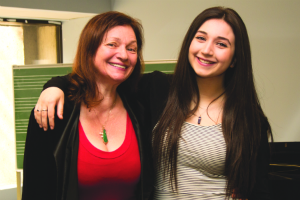
Along with her classical studies, Isabella plans to pursue her singing and songwriting interests with MRU’s new Songwriting course, part of the Conservatory’s new Popular Music offerings.
Isabella has recorded a CD and will do a concert tour starting in August.
Listen to Isabella Perron on SoundCloud.
Wrapping up a successful Morningside Music Bridge
As another year of Morningside Music Bridge wraps up, we’re looking back at how the music training program for teens got its start.
We caught up with Gwen Hoebig, a founder and artistic co-director of Mount Royal Conservatory’s summer program, to talk about why Morningside Music Bridge still matters after 18 years.
Hoebig is concertmaster of the Winnipeg Symphony Orchestra and has been there from the very beginning of MMB in 1998.
“With the Chinese students in those days, it was felt they reached their physical peak at age 16, and Andy Chan, our founder, couldn’t understand why the Chinese kids largely declined after the age of 16. So the middle school was really the best school (for music training), not the university. The Canadian students did most of their developing after the age of 16,” Hoebig said.
“The idea originally behind it was to bring the two cultures together to help the Chinese grow beyond age 16 and encourage the Canadians to grow a litte faster.”
Morningside Music Bridge was born. Bringing the top instructors from Beijing’s Central Conservatory of Music and Canada’s best local and visting faculty from Mount Royal Conservatory, music created a cultural bridge that made a difference. Eighteen years later, the educational partnership brings Poland into the mix, and the world’s leading musicians coming to teach teenagers from Canada, China, Poland, the United States and this year, Taiwan.
“It has worked in ways we cannot believe,” said Hoebig. “It has been so successful, the standard of the students that we see is much more consistent from country to country than we’ve seen before.”
Classical music training, including master classes, is typically offered to university-aged students and working musicians.
Morningside Music Bridge focuses on teens, but also children as young as 12, to help nurture and guide gifted young musicians.
“Music Bridge deals with a very special age group, it is high school students. I think a lot of programs steer away from that age group partly because they’re still kids. But we’ve been able to successfully sort out how to deal with that age and what excites us is the potential that all these kids bring to Music Bridge and to their music-making and the social aspect of it all,” said Hoebig. “It is just wonderful to see these young people blossom and to watch them come back so much stronger. It is just incredible the difference we see when the kids come back, which they do.”
The program is also enriching for visiting faculty, who hail from countries world-wide.
“My favourite part about the faculty is that even through we come from all over the world and come from extremely different backgrounds in training and teaching, we are all coming from different angles and we’re all aiming for the same thing: to make the students better to make the students’ understanding grow,” she said. “I might say something, Bill van der Sloot might say something, Tong Weidong, head of violin department at the Central Conservatory of Music in Beijing, and Tadeusz Gadzina from Poland, and it’s completely different but we’re aiming for essentially the same thing. I think it’s so eyeopening for the children to see these different points of view but they’re all aiming for the same thing.”
By Sherri Zickefoose, Aug. 1, 2014
A Conversation with Conductor John Thompson
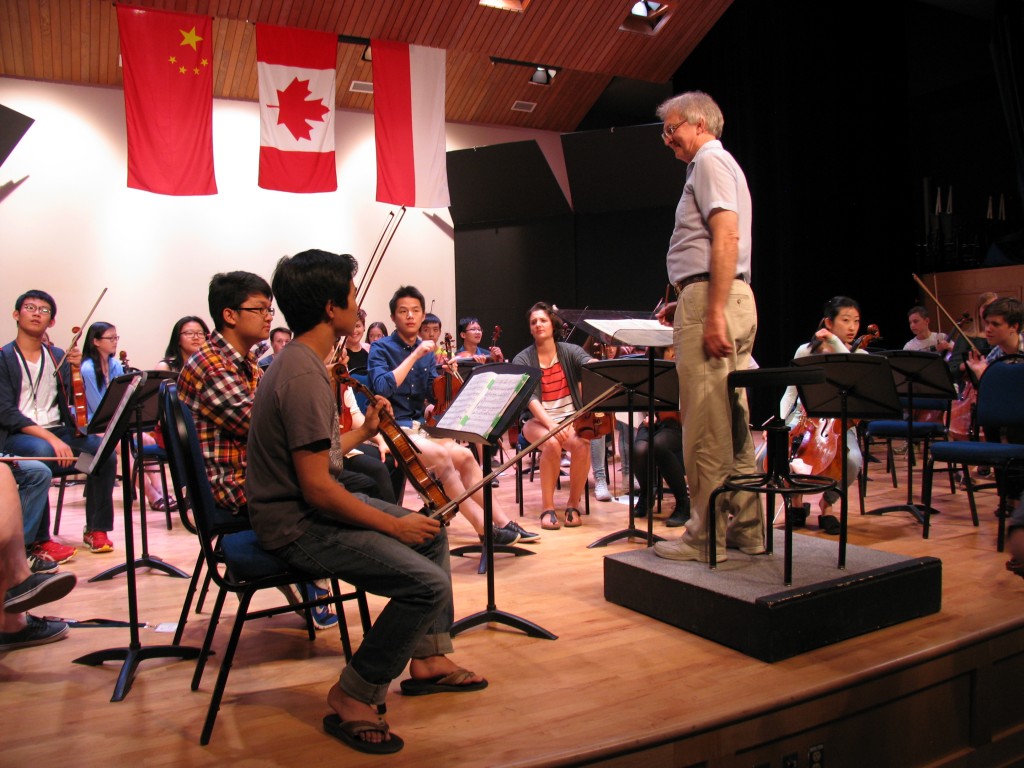
Considering they experience just four orchestra rehearsals before performing, Morningside Music Bridge string musicians couldn’t ask for a better conductor than John Thompson.
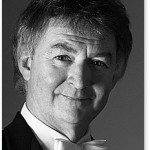
The chamber coach is Mount Royal Conservatory’s Academy chamber music program coordinator and conductor for our Conservatory strings.
But during Morningside Music Bridge, he coaches chamber and conducts the MMB Orchestra, this year leading them through Fantasia on a Theme by Thomas Tallis.
“Being of English heritage, it’s one of my favourite pieces from England. I love the piece, I’m happy to work on it,” said Thompson on the eve of the performance.
Question: What’s it like coaching top students from around the world?
John Thompson: The students do play at a very high level, they have a lot of skills to begin with. Most of them are pretty well technically equipped. You can spend more time on musical elements and colour and moods of music rather than just trying to teach them how to shift.
Question: As the conductor, you don’t have much time to rehearse. What has that been like?
John Thompson: Some have less orchestral experience than others, and so there are elements of counting and listening. They have to develop those skills. But when you put them all together it’s a wonderful combination of talent.
Question: What’s the best part of a program like Mornginside Music Bridge?
John Thompson: I think that because there are different countries, they’re exposed to a lot of different kids of music. They get great teaching from a variety of instructors. They do a lot of performing and there’s a lot expected of them. They’re all very motivated. And they make very good friendships and they learn a lot from each other.
A Conversation with Cellist Wei Yu
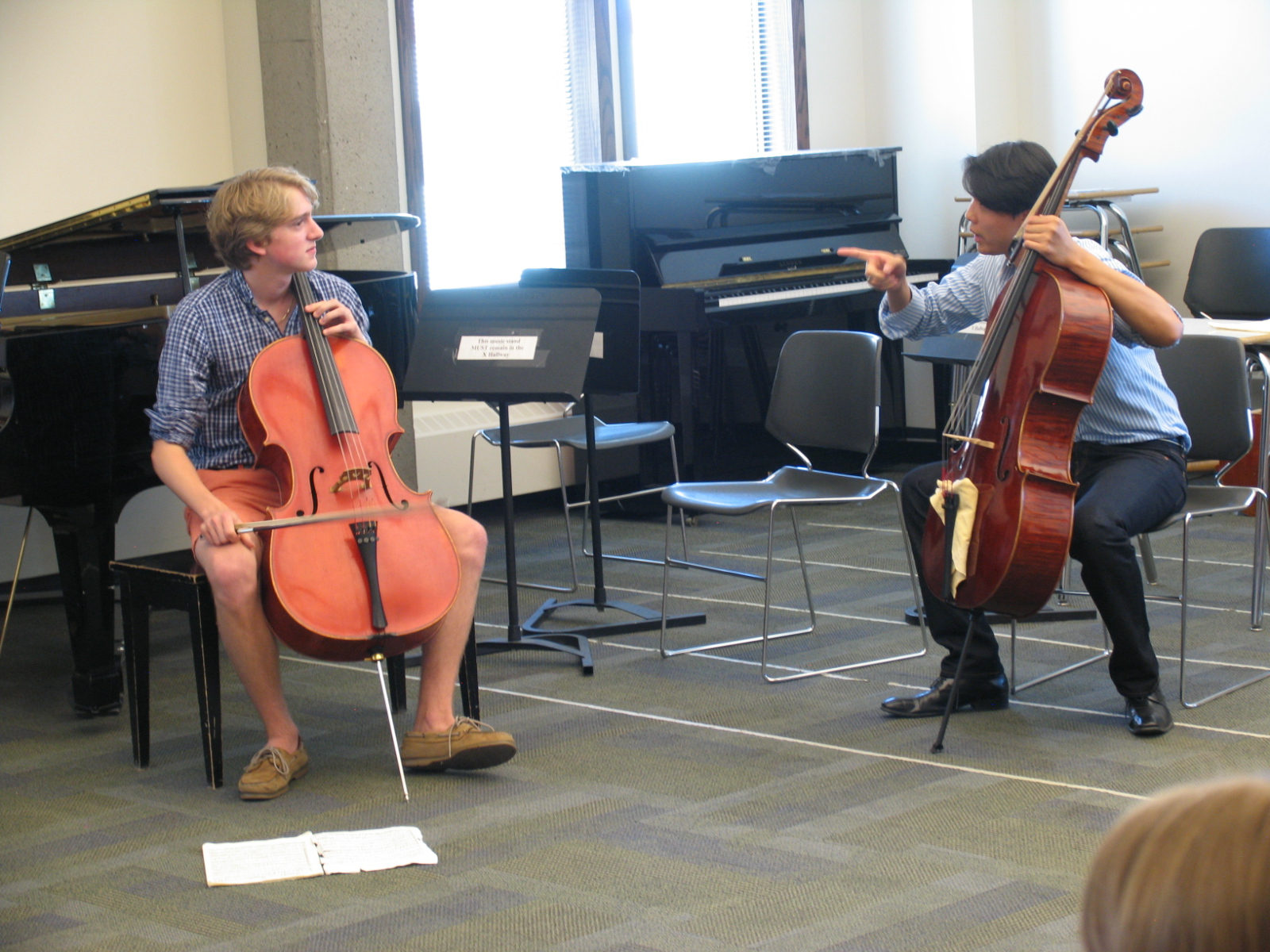
How else would a busy cellist with the New York Philharmonic wrap up a performing season? By travelling to Calgary to teach master classes and back-to-back private lessons at Morningside Music Bridge, of course.
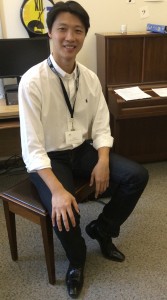
For Wei Yu, returning to teach where his career began is time well spent.
Before the prize-winning musician joined the New York Phil in 2007 at age 26, Wei Yu started studying at Mount Royal Conservatory’s Morningside Music Bridge in 1998 with our John Kadz.
He remained in Calgary for two years, joining our Academy for Gifted Youth program, and later winning the Rose Bowl — the top prize at the annual Calgary Kiwanis Festival in 2000.
From Calgary, the Shanghai-born Yu went to Chicago to further his music study, and later received his master’s degree at the Juilliard School. We can think of no better instructor for our international music training school than the MMB alumnus.
Question: You started playing cello at age four and made your concerto debut with the Shanghai Symphony Orchestra when you were just 11 years old. How does that reflect in your teaching style?
Wei Yu: For me as a player, I went through a lot. Teaching what I have learned in my recent history especially influenced by great teachers like John Kadz, David Soyer and Hans Jørgen Jensen helps. I feel like I can really relate to the young players because I feel like I went exactly the same path yesterday. Physically and mentally, I can relate to the students here based on my experience.
Question: You are returning as faculty for the second year. Why did you want to come back? What is it about the program you like?
Wei Yu: This program has given me so much in the past. This is the starting point of my career, it’s from Music Bridge and from Calgary being at the Academy. I cannot describe with words! I was here 15 years ago as a student and coming back as a faculty member and meeting wonderful teachers here and colleagues… it’s just like a reunion. I think it’s time for me to give back and contribute more.
Question: How important is it to help shape the upcoming generation of classical musicians on the track to professional careers?
Wei Yu: Seeing the young generation of talents emerging — it’s a thrilling experience. It’s grown so much and in a very positive way developed over the past decades. There are so many soloists out there from this program. I wish everybody in the music world knew about this program. You see a lot of top notch talent return to the program year after year, both faculty and students.
Here’s what Noah, 14, from New York has to say about taking master classes with Wei Yu, who he occasionally sees outside Lincoln Center on his way to Julliard School prep class.
“He’s obviously a great teacher. It was great to get his wisdom and experiences. He’s very focused on making a great sound, relaxing your body so you can make a big sound. He has a good perception on how to create a really melodic and expressive sound.”
Click here for a list of upcoming recitals and concerts until July 31.
A Conversation with Clarinetist Fan Lei
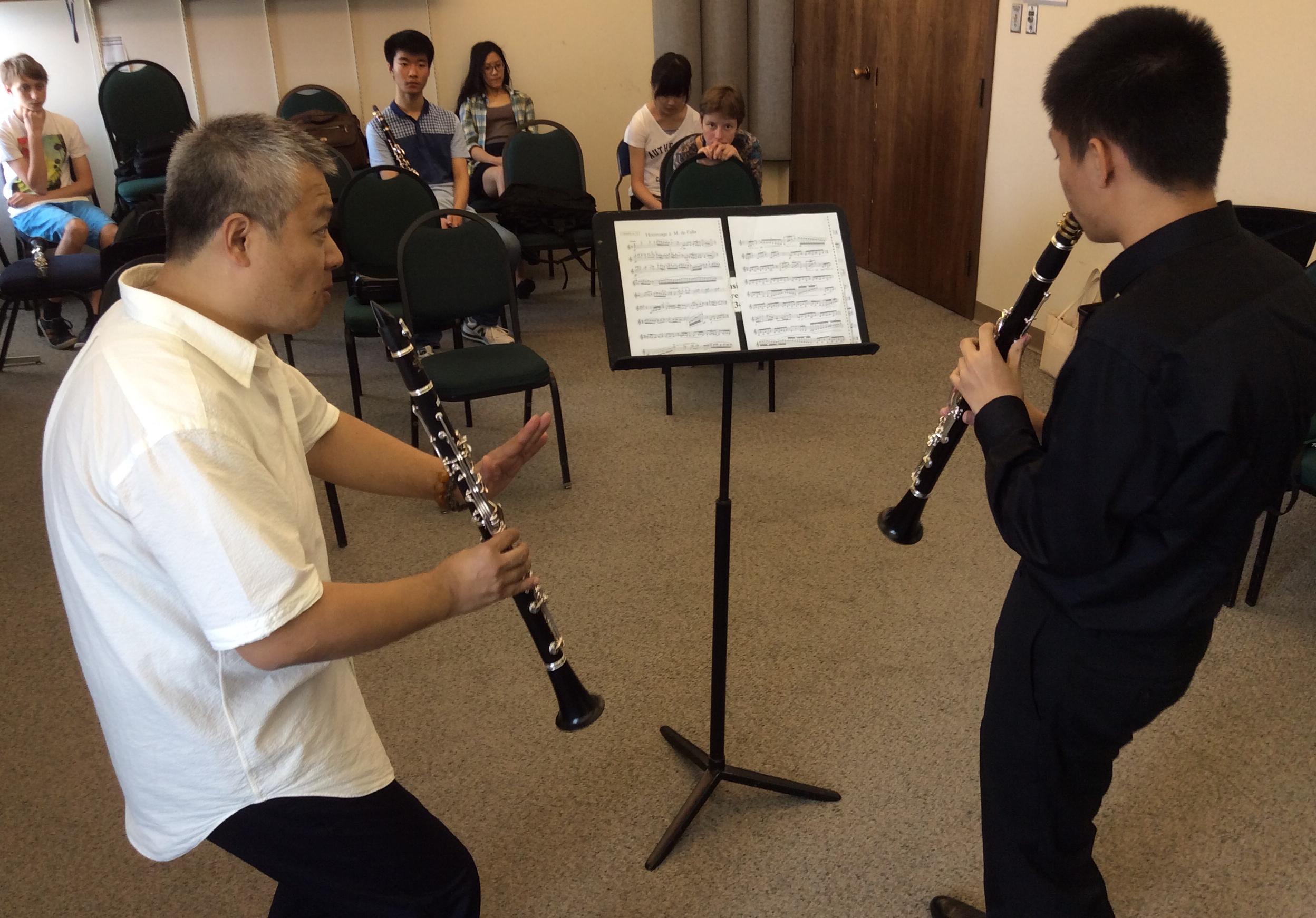
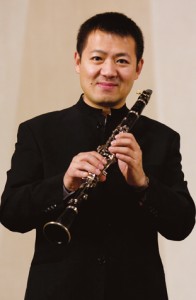
Fan Lei is regarded as China’s premier clarinetist so it comes as no surprise he’s helping usher in the woodwind to Morningside Music Bridge.
Clarinet was added to the MMB roster as a trial case last year, and it was such a success that Fan Lei returns for a second year. When he’s not teaching as a professor at Beijing’s Central Conservatory of Music or giving master classes at the Julliard School, Banff Centre and beyond, Fan is a busy soloist and recitalist throughout the United States, Canada and Asia.
Question: What is your teaching philosophy?
Fan Lei: I try to make everybody better. I try to instill confidence in their personality and playing. I think those are the two most important things to do.
Question: You were here last year to introduce clarinet to the program for its trial year. How does that compare to this year?
Fan Lei: We’ve doubled our students from three to six. I think the quality gets better and better.
Question: What makes a program like Morningside Music Bridge special?
Fan Lei: I think the world is getting smaller in terms of having very elite music programs, especially like this one for musicians under 18 years old. You just don’t have that many in the world. This is one of the special ones. To think they’ve had this for 18 years, at a very high level from the beginning, you can tell many of the alum got many great jobs anc come back as artist teachers it’s a great thing to see.
Click here for a list of upcoming recitals and concerts until July 31.
A Conversation with Violist Teng Li
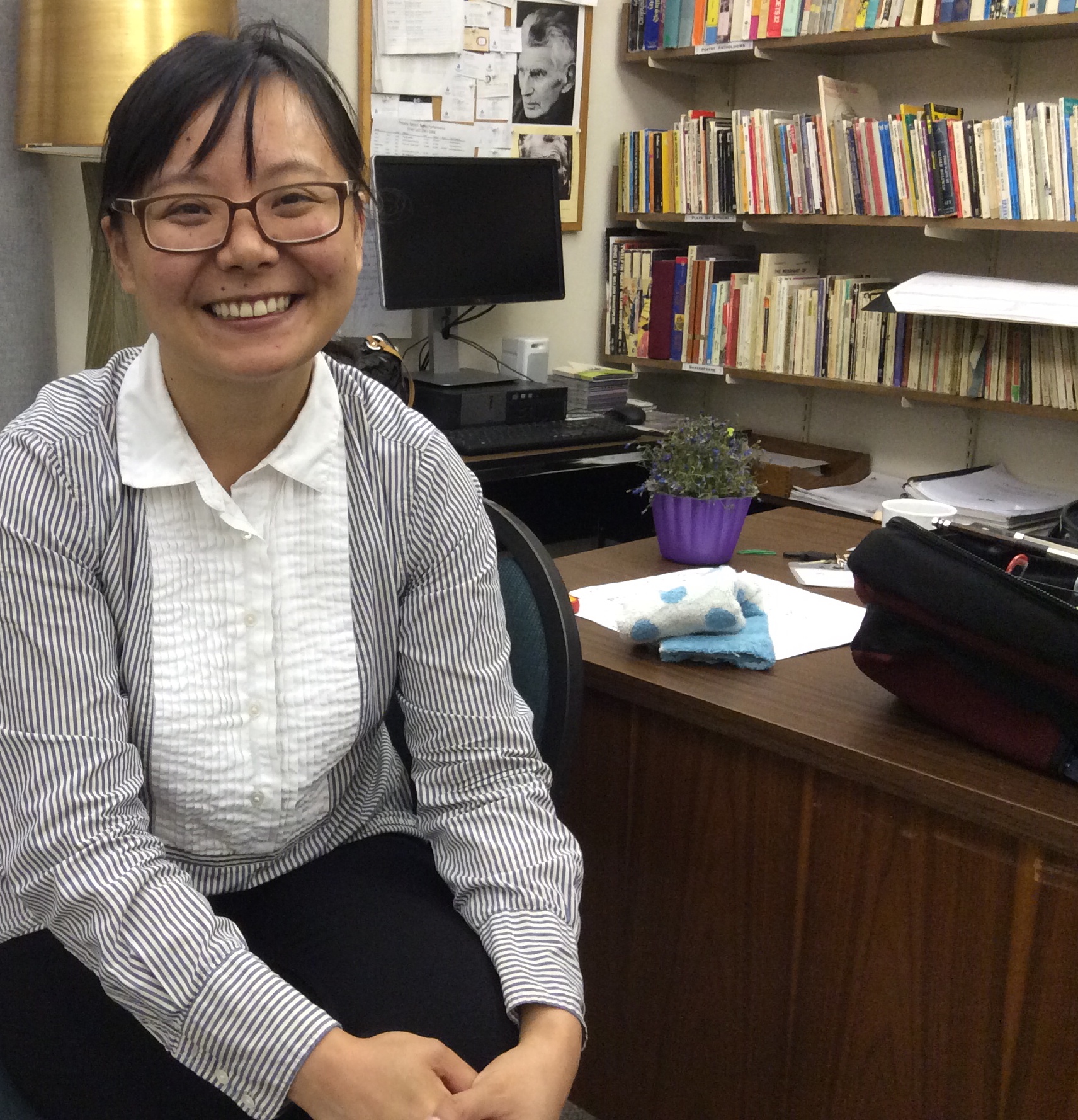
 Teng Li was one of the first viola students in the Morningside Music Bridge summer program 16 years ago.
Teng Li was one of the first viola students in the Morningside Music Bridge summer program 16 years ago.
Teng began playing violin at age five in China, and entered Beijing’s Central Conservatory in 1992. By age 16, she was studying viola at the Curtis Institute of Music in Philadelphia. That was the year she came to Calgary’s Mount Royal Conservatory for Morningside Music Bridge.
Now, Teng Li is principal violist of the Toronto Symphony Orchestra and teaches at the University of Toronto and Montreal’s Conservatoire De Musique.
She says even with her strong early musical education, Morningside Music Bridge offered a new level of learning:
Teng Li: I find that coming to Music Bridge was the start of my mind working with my musical spirit. I learned a lot about why you do certain things, what makes sense with your musical feeling and if it doesn’t make sense, how you make it work.
Question: You were a gifted young student, but you mentioned something happened when you came to study in Calgary as a teenager.
Teng Li: It was difficult at first, it was a transitional period. For Chinese students, that’s what the program helps them to do, especially at this age, from 12 to 18. That’s really when you form your opinion about things and the program really helps you to learn that the more experience people have, the more they learn about music. And you’re trying to learn music in your way.
Question: What is it like coming back to MMB after being a student?
Teng Li: This really is like a family. You come back and you have that connection.
Click here for a list of upcoming recitals and concerts until July 31.
A Conversation With Violinist Jonathan Crow

Jonathan Crow is a familiar face to Canadian music and symphony lovers who are fans of his
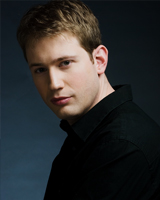
New Orford String Quartet and the Toronto Symphony Orchestra, where he is concertmaster.
As assistant professor of violin at McGill University, Crow knows the value of nurturing young talent. He was just 19 when he joined the Montreal Symphony as associate principal second violin, only to win the associate concertmaster’s chair five months later.
Crow travels to Calgary to teach Mount Royal Conservatory’s Academy for Gifted Youth violinsts, and this summer marks his second year as faculty for our Morningside Music Bridge summer training program.
Question: What’s your teaching philosophy?
Jonathan Crow: The most important thing in teaching is to teach to what the kids need. I’m not a fan of a whole system. There’s many different schools of teaching: Russian, the Franco-Belgian school. For me, while these are great to know about, I think it’s important that you teach to what the students need. If you’re talking technically, everybody has different sizes, different lengths of arms. You find a way to teach technique that fits the body type. You find a way to teach the music that isn’t just inflicting your own ideas upon students but helping them to discover their ideas, and how to make choices about things musically instead of just reciting by rote what they hear from their teacher.
Question: You’ve come to teach at MMB for two years now. What makes this program special?
Jonathan Crow: I think the idea of having people from all across the world learning from each other is important and I think it’s important that we have great teachers here. But it’s just as important that the kids are learning from each other. We have master classes every day. The kids from Canada hear kids from the U.S. hear kids from Poland hear kids from China playing. We all learn different ways of approaching music and we all learn from each other. I think having a critical mass of players and teachers and mentors from all around the world gives us so many opportunities to learn in different ways.
Click here for a list of upcoming recitals and concerts until July 31.
MMB Student Spotlight: Tate

This is Canadian cellist Tate’s fifth year at Morningside Music Bridge.
Along the way, he’s learned from the best. Here he is in cellist Tian Bonian’s master class.
Tate started playing cello at the age of three. By the time he reached 12, he’d made his debut as a soloist with the Vancouver Symphony Orchestra. Currently, he is principal cellist of the Vancouver Youth Symphony Orchestra. The award-winning musician continues taking top prizes at the Canadian Music Competition for strings.
Tate is a familiar face at the Conservatory. Throughout the year, he flies to Calgary every month training with our John Kadz.
We caught up with Tate as he was en route to — you guessed it — more practice.
Question: This is your fifth year coming to study at MMB. What keeps you coming back?
Tate: Just in general all over, it’s fun. It’s good to make connections with other students.
Question: What do you like about MMB?
Tate: It’s a great program. There’s other things out there but this is full scholarship and it’s well-rounded. You get chamber music, orchestra, master classes, lessons every day. It’s great.
By Sherri Zickefoose, July 23, 2014.
A Conversation with Cellist Brian Manker
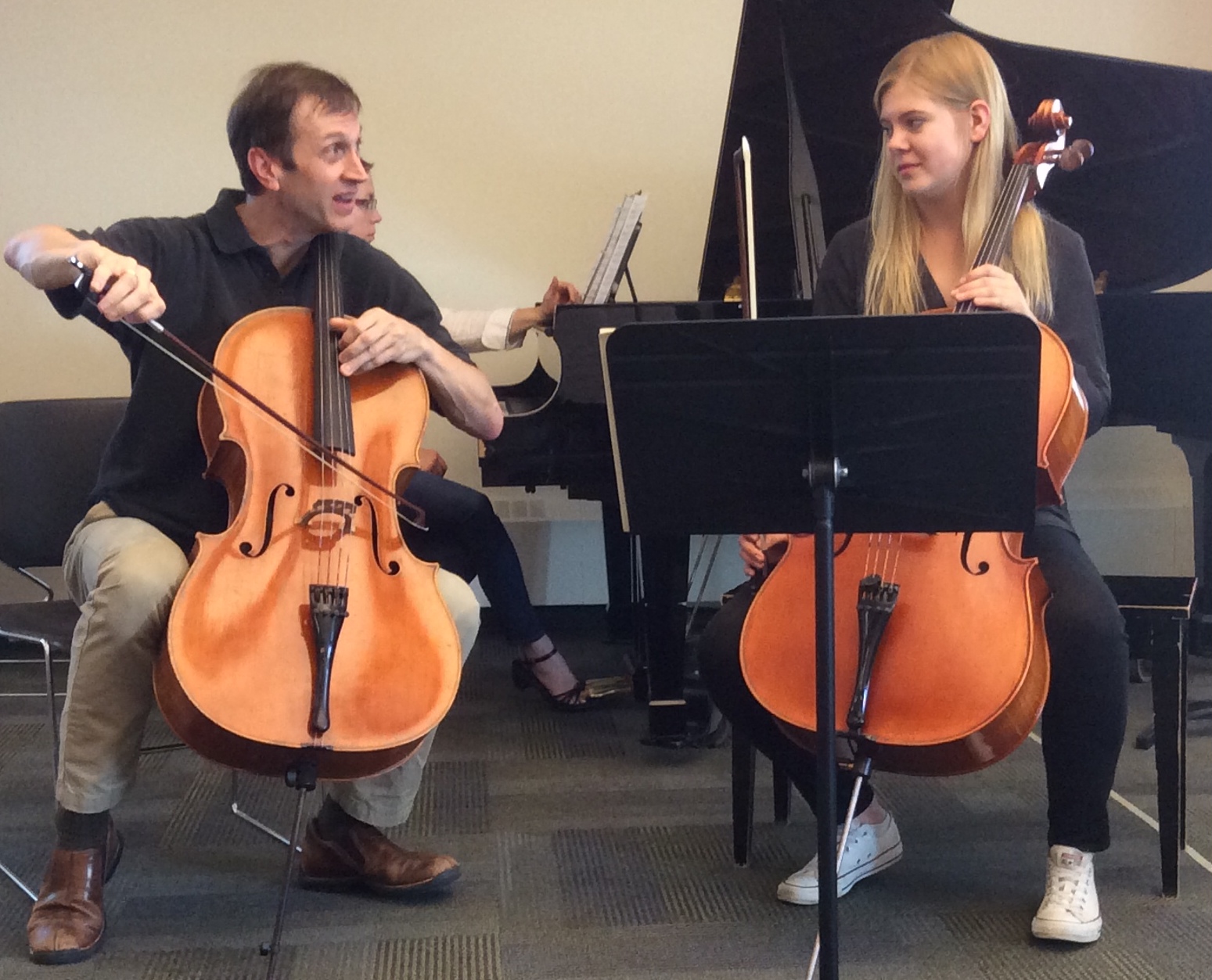
Solo concerto performer. Montreal Symphony Orchestra principal cellist. Adorno Quartet and New Orford String Quartet member. Blogger. Brian Manker does it all.

The multi-faceted Canadian performer and teacher travels the world, performing chamber music with the most distinguished artists.
While he currently teaches at the Schulich School of Music of McGill University, Manker’s teaching has taken him to West Texas State and Emory universities. And after performing with his New Orford String Quartet at Mount Royal Conservatory’s Wyatt Artist in Residence program, Brian Manker is teaching Morningside Music Bridge students all week long. The international students are learning from the best, and we asked Brian about his teaching and early days as a student.
Question: What’s your teaching style?
Brian Manker: It’s like being a gardener: you water them, give them sun and hope to watch them bloom. That’s the way you have to approach it, and not judge them if some bloom later than others.
Question: What’s so special about Morningside Music Bridge?
Brian Manker: It’s important for young people to see the level that’s out there and see how they fit into that and what they need to do if they’re committed to go further. I think that’s great because the level is very high. I wish I’d had something like this at their age. It would have been a wake-up call: ‘Oh, my gosh, they’re so good. I’m terrified. I’d better get to work!’ I think it has a positive effect. I think that’s incredibly important.
Question: What does Morningside Music Bridge offer outside of music training?
Brian Manker: I can’t say I’ve ever seen anything quite like it. I think the best thing in the world is for people to get out of their little boxes and encounter each other. That way we realize we share more than we think.
Here’s what student Zophia, 17, from Poland has to say about her master class with Brian Manker:
“I think he’s just amazing. He told me some important things and helped raise my playing right away. It was our very first meeting, and I was so excited. He’s a great, great teacher.”
And her take on MMB:
“It’s a hard month, but there are a lot of opportunities for us here. We have a great chance to improve.”
Click here for a list of upcoming recitals and concerts until July 31.

